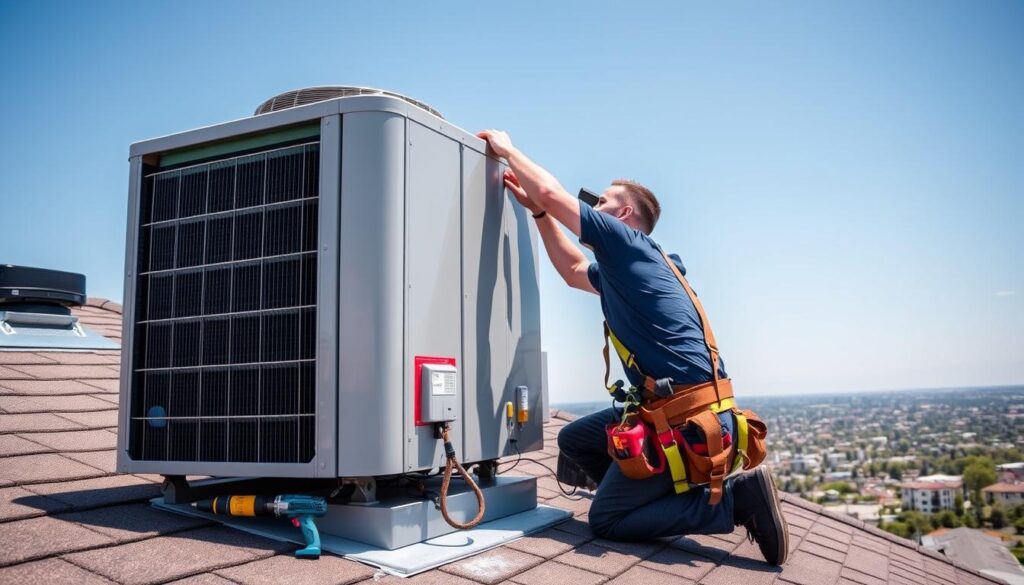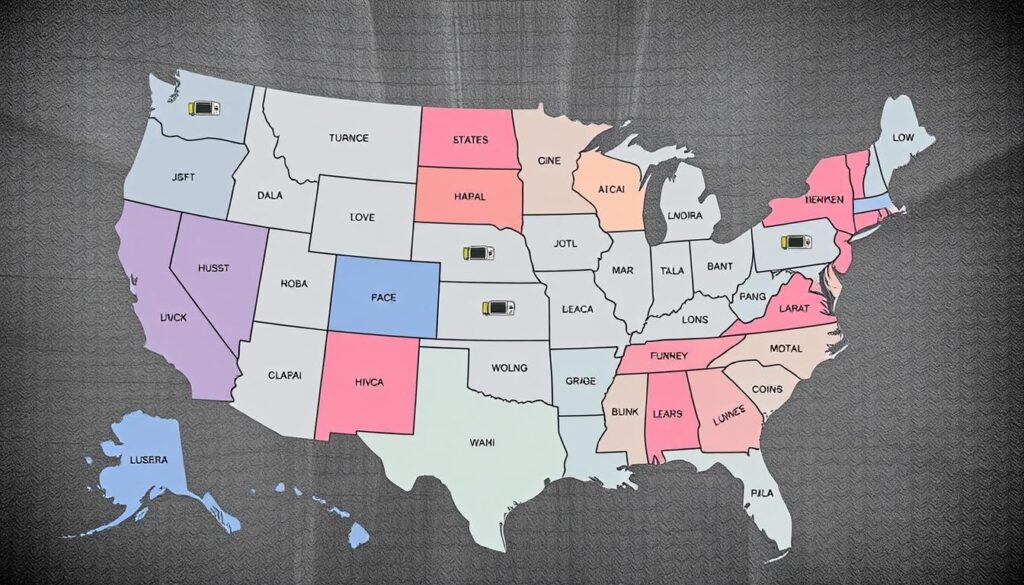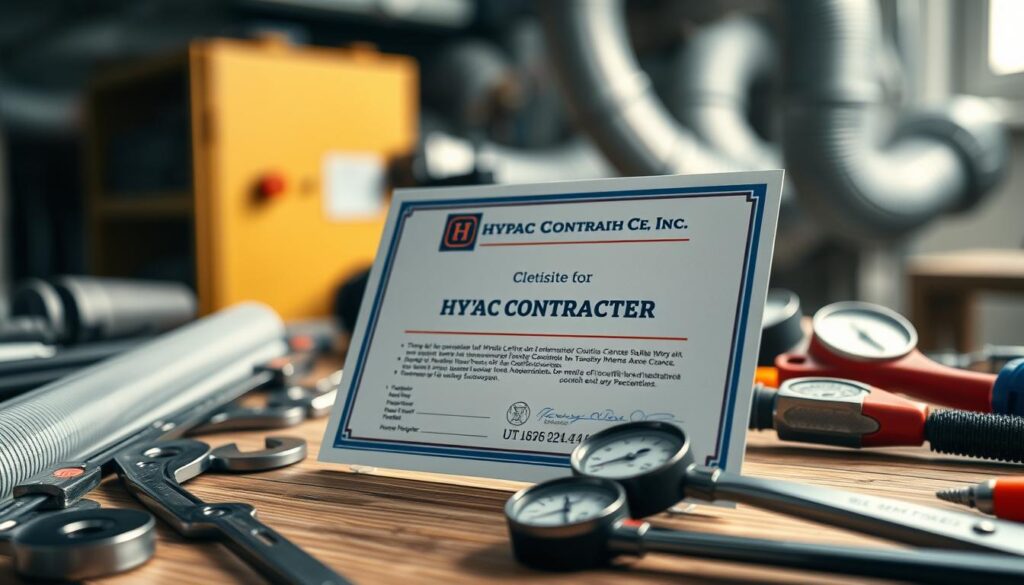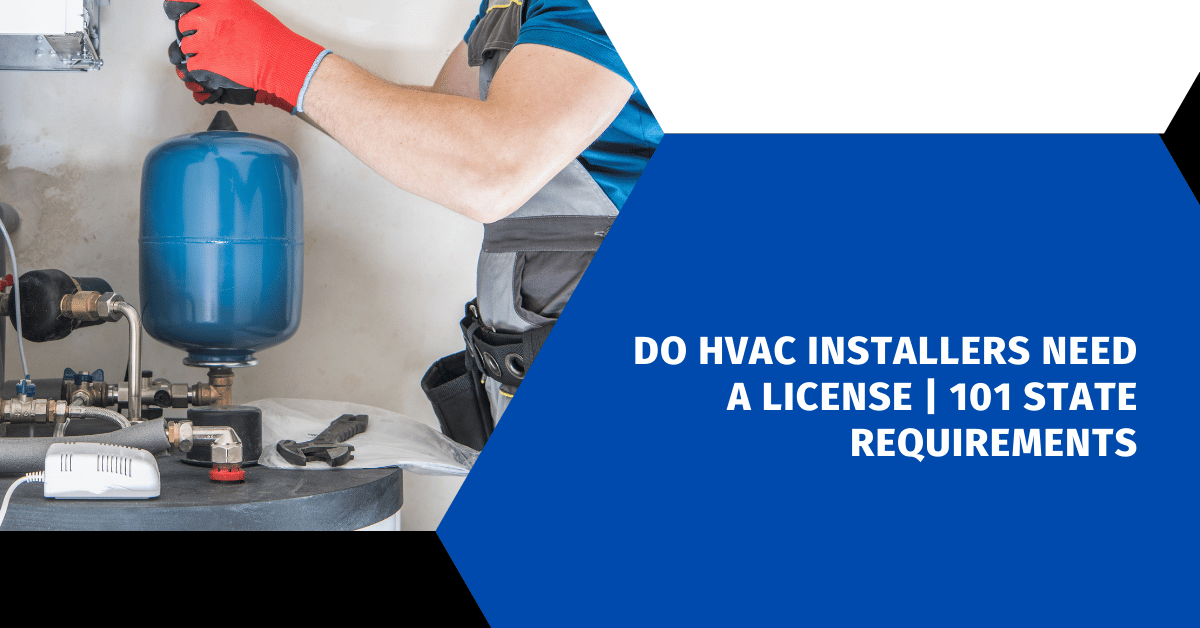Affiliate Disclosure
HVAC Guide Guys is a participant in the Amazon Services LLC Associates Program, an affiliate advertising program designed to provide a means for sites to earn advertising fees by advertising and linking to Amazon.
Do HVAC Installers Need a License? It was a chilly winter morning when Sarah, a newly certified HVAC technician, arrived at her first job site. She had spent months studying the complex regulations and procedures required to legally operate as an HVAC installer in her state. As she double-checked her tools and equipment, Sarah felt a mix of excitement and trepidation, knowing that proper licensing and certification were essential to her success in this industry.
Across the United States, the HVAC (Heating, Ventilation, and Air Conditioning) industry is booming. There’s a high demand for skilled professionals who can install, maintain, and repair heating and cooling systems in residential and commercial buildings. However, the requirements to legally work as an HVAC installer vary widely from state to state. It’s crucial for professionals in this field to understand the specific licensing and certification rules in their area.

In this comprehensive guide, we’ll explore the diverse HVAC licensing requirements across the United States. We’ll help you navigate the complex landscape. This will ensure you’re equipped with the necessary credentials to succeed in this rewarding career.
Key Takeaways
- HVAC licensing requirements vary significantly by state, with some states requiring extensive experience and exams, while others have no state-level licensing.
- The Environmental Protection Agency (EPA) mandates all HVAC technicians to obtain an EPA Section 608 certification for handling refrigerants.
- Many states require HVAC contractors to carry various types of insurance, such as general liability, workers’ compensation, and performance bonds.
- HVAC certification costs can range from a few hundred to a few thousand dollars, depending on the state and certifying organization.
- Pursuing additional HVAC certifications, such as NATE (North American Technician Excellence), can enhance a technician’s credentials and job prospects.
Table of Contents
Understanding HVAC Licensing Requirements Across the United States
Licensing for HVAC work varies by state. This is because different areas have unique climate and environmental needs. It’s important for both HVAC pros and homeowners to know these rules.
Federal EPA Requirements for HVAC Technicians
The Environmental Protection Agency (EPA) has rules for HVAC techs. They need an EPA 608 certification to handle refrigerants safely. This ensures they know how to work with these materials properly.
State vs. Local Licensing Requirements
States have their own rules for HVAC licenses. Some states don’t need licenses, while others are strict. Local areas might also have their own rules, even if the state doesn’t.
Types of HVAC Licenses Available
Different states offer different HVAC licenses. You might see journeyman, contractor, or specialty certifications. For example, Arizona and California have Class A and Class B licenses. Choosing a licensed contractor in your state means they follow local rules and do quality work.
| HVAC Role | Median Annual Salary | Median Hourly Pay |
|---|---|---|
| HVAC Engineer | $77,036 | $37 |
| HVAC Installer | $64,306 | $31 |
| HVAC Technician | $64,306 | $31 |
| HVAC Supervisor | $83,903 | $40 |
Things like where you work, your education, and experience can affect your pay. Some jobs might also offer extra pay or bonuses.
It’s key for people to know about hvac licensing by state. This helps them choose the right HVAC contractor. Knowing about hvac certification programs and hvac license exam rules helps homeowners get the best service.
Explore Our HVAC Shop
Looking for top-rated HVAC tools, parts, and accessories? Visit our shop and find the perfect solution for your needs.
Visit the ShopDo HVAC Installers Need a License: Essential Requirements
To become an HVAC installer, getting a license is key. In most states, HVAC installers must have a valid license. This license shows they have the skills and knowledge to do the job right.
Getting a license means being at least 18, having a high school diploma or GED, and finishing an approved HVAC training program. States also ask for a certain number of hours of experience, usually between 2,000 to 4,000 hours.
One important certification is the EPA Section 608 certification. It’s needed for anyone working with refrigerants. This ensures they know how to handle these materials safely and follow environmental laws.
To get a license, HVAC installers must pass a big exam. This exam tests their trade knowledge, business skills, and understanding of state laws. It makes sure they can do the job well and safely.
“Licensing in the HVAC industry ensures public safety, professional integrity, and adherence to state regulations, providing confidence to clients and employers in the technician’s capabilities and expertise.”
In short, to get a license, HVAC installers need to be of legal age, have a high school diploma or GED, finish HVAC training, get the needed experience, and pass exams. This whole process makes sure HVAC services are safe and of high quality.
Basic Qualifications for HVAC Licensing
Starting a career in HVAC in the United States means getting the right licenses and certifications. The rules for HVAC licenses differ by state. But, there are some basic steps that future HVAC installers and technicians must follow.
Educational Prerequisites
To enter the HVAC field, you need a high school diploma or GED. Many states also ask for an HVAC certification or apprenticeship. These programs teach you about HVAC system design, installation, upkeep, and fixing.
Experience Requirements
Getting an HVAC license often requires 2 to 5 years of experience. This experience can come from apprenticeships or supervised jobs. Some places might let you use some of your education to meet this requirement.
Application Process Overview
The HVAC licensing application process includes showing your education and experience, passing background checks, and taking exams. These exams test your technical skills and knowledge of business and law in HVAC. The details and fees for these steps vary by state and area.
To get an HVAC license, you need education, experience, and passing exams. Meeting these requirements lets you work legally and safely in the HVAC field.
| Qualification | Requirement |
|---|---|
| Education | High school diploma or GED, HVAC certification program or apprenticeship |
| Experience | 2-5 years of supervised work experience or apprenticeship |
| Licensing Exams | Technical knowledge, business and legal knowledge |
| EPA Certification | EPA Section 608 Certification for handling refrigerants |
“Obtaining the necessary HVAC licenses and certifications is crucial for ensuring the safety, efficiency, and legality of HVAC installations and services.”
Explore Our HVAC Shop
Looking for top-rated HVAC tools, parts, and accessories? Visit our shop and find the perfect solution for your needs.
Visit the ShopStates Without HVAC Licensing Requirements
Many states have strict rules for HVAC licensing. But, some states don’t require it at the state level. These include Colorado, Illinois, Indiana, Kansas, Maine, Missouri, New Hampshire, New York, South Dakota, Vermont, and Wyoming. Yet, local rules might still apply to HVAC professionals.
In these states, HVAC techs must get the EPA Section 608 certification for refrigerants. Some states also need HVAC businesses to have a general business license or contractor registration, even without a specific HVAC license.
| State | HVAC Licensing Requirement |
|---|---|
| Colorado | No state-level HVAC licensing, but local licensing may be required. EPA Section 608 certification is mandatory for refrigerant handling. |
| Illinois | No state-level HVAC licensing, but some municipalities may have their own requirements. EPA Section 608 certification is required. |
| Indiana | No state-level HVAC licensing, but local regulations may apply. EPA Section 608 certification is necessary. |
| Kansas | No state-level HVAC licensing, but local jurisdictions may have their own requirements. EPA Section 608 certification is mandatory. |
| Maine | No state-level HVAC licensing, but some municipalities may have their own rules. EPA Section 608 certification is required. |
| Missouri | No state-level HVAC licensing, but local jurisdictions may have their own regulations. EPA Section 608 certification is necessary. |
Even without statewide HVAC licensing, HVAC pros must follow local rules. The EPA Section 608 certification is a must for refrigerant work, no matter the state’s rules.

Explore Our HVAC Shop
Looking for top-rated HVAC tools, parts, and accessories? Visit our shop and find the perfect solution for your needs.
Visit the ShopCommon HVAC License Classifications and Categories
HVAC licensing has many classifications and categories. It’s important to know these to follow the rules and meet state or local needs.
Class A and Class B Licenses
HVAC licenses come in Class A and Class B. Class A lets technicians work on any HVAC system size. Class B might limit them to smaller or simpler systems. Each class has its own rules based on where you are.
Specialty HVAC Certifications
There are also specialty certifications for HVAC pros. These show you’re good at things like residential, commercial systems, or energy management. Getting these can make you stand out and improve your job chances.
Contractor vs. Technician Licenses
There’s a big difference between contractor and technician licenses. Contractor licenses need business skills and let you run an HVAC company. Technician licenses focus on the hands-on work like installing and fixing systems. Some places have levels like apprentice, journeyman, and master to show experience.
| License Type | Description | Common Requirements |
|---|---|---|
| Class A HVAC License | Allows work on HVAC systems of any size | Extensive experience, passing specialized exams |
| Class B HVAC License | Restricted to smaller HVAC systems | Moderate experience, passing basic exams |
| HVAC Contractor License | Allows operation of an HVAC contracting business | Business knowledge, management skills, experience |
| HVAC Technician License | Focuses on hands-on HVAC installation and repair | Technical skills, passing trade-specific exams |
Understanding HVAC licensing can be tough. But knowing the different types is key to success. Whether you’re new or experienced, staying up-to-date on licensing can lead to more opportunities. It also helps you serve your clients better.
Insurance and Bonding Requirements for HVAC Contractors
As an HVAC contractor, knowing the insurance and bonding rules is key. These rules help protect both you and your clients. They make sure HVAC work is done by skilled pros who can be held responsible.
In many places, like New York, HVAC pros must have certain insurances. This includes general liability insurance for property damage or injuries. Workers’ compensation insurance is also needed to cover employees in accidents. Sometimes, professional liability insurance is required too.
Bonding is another important rule. It can be a performance bond or a surety bond, costing between $10,000 and $25,000. These bonds ensure you’ll do what you agreed to do.
The rules for insurance and bonding can change based on your license type. For instance, in New York, Class A contractors might need more coverage than Class B. Knowing these details is key to following the law and protecting your business.
Having the right insurance and bonding shows you’re serious about your work. It’s important when you’re getting an hvac contractor license. Make sure you know the rules in your area.
“Proper insurance and bonding coverage is essential for HVAC contractors to safeguard their business and clients.”

Comprehensive Coverage for HVAC Contractors
- General liability insurance to protect against property damage and personal injury claims
- Workers’ compensation insurance to cover employee-related accidents and injuries
- Professional liability insurance to safeguard against errors and omissions
- Performance or surety bonds to guarantee contract fulfillment
By following all insurance and bonding rules, you can work with confidence. You’ll offer top-notch service and build a solid reputation in the HVAC field.
Explore Our HVAC Shop
Looking for top-rated HVAC tools, parts, and accessories? Visit our shop and find the perfect solution for your needs.
Visit the ShopHVAC License Examination Process and Preparation
Getting an HVAC license is key for those wanting to work in the HVAC field. The exam tests both technical skills and business knowledge. This makes sure HVAC workers can do their jobs well.
Trade Knowledge Testing
The technical part of the exam checks if you know about HVAC systems and safety. You need to show you can design, install, and fix HVAC systems. This is important for keeping HVAC systems safe and working right.
Business and Law Examinations
HVAC pros also need to know about business and laws. The exam asks about contracts, managing a business, and laws specific to each state. This helps HVAC workers run their businesses well and follow the law.
To get ready for the exam, you can study approved materials, take practice tests, and go to prep courses. Some places use outside testing services to make the exam fair for everyone.
| Statistic | Value |
|---|---|
| Median pay for Heating, Air Conditioning, and Refrigeration Mechanics and Installers in the U.S. | $50,590 per year |
| HVAC industry job growth projection by 2030 | 19,000 jobs |
| Hours required for HVAC contractor license in Alabama | 3,000 hours (18 months) |
Passing the HVAC license exam shows you’re serious about your work. It proves you can provide safe and reliable services. Getting a license opens up more career chances and helps you grow in the HVAC field.
License Maintenance and Renewal Requirements
Keeping an HVAC license current is key for those in the Heating, Ventilation, and Air Conditioning (HVAC) field. In the U.S., HVAC licenses need to be renewed every year or two. To renew, you might have to take continuing education courses, pay fees, and keep your insurance and bonds current.
In some places, HVAC pros must show they’re still working in the field to keep their licenses. These courses update you on building codes, safety rules, and new HVAC tech. This keeps HVAC techs and installers up-to-date and skilled.
If you don’t renew your HVAC license on time, you might face extra costs or have to retake exams. So, it’s important to know your state’s rules for renewing HVAC licenses. This way, you can keep your career on track without any hitches.
| Requirement | Details |
|---|---|
| Renewal Frequency | HVAC licenses typically require renewal annually or biennially. |
| Continuing Education | Completing ongoing education courses on building codes, safety regulations, and new HVAC technologies. |
| Renewal Fees | Paying the applicable renewal fees, which can vary by state. |
| Insurance and Bonding | Maintaining the required levels of insurance and bonding. |
| Ongoing Work Experience | Some states may require proof of active work in the HVAC field to maintain licensure. |
By following the hvac license renewal rules in your state, HVAC pros can keep their licenses valid. This helps their careers grow and succeed.
Explore Our HVAC Shop
Looking for top-rated HVAC tools, parts, and accessories? Visit our shop and find the perfect solution for your needs.
Visit the ShopProfessional HVAC Certifications and Career Advancement
HVAC professionals can get more certifications to boost their careers. The North American Technician Excellence (NATE) certification is well-known. It shows a technician’s skill level. Other top certifications are from HVAC Excellence and the Refrigeration Service Engineers Society (RSES). They focus on energy efficiency, building automation, and green tech.
These certifications need ongoing education to keep them current. This helps HVAC pros stay updated with new tech. Getting certified can lead to better pay, more job chances, and a chance to focus on specific HVAC areas.
For those looking to grow in their careers, HVAC certification programs are a smart choice. These programs teach a lot, from EPA certification for refrigerant work to courses on solar HVAC, hydronic heating, and smart systems.
| Certification | Overview |
|---|---|
| EPA Certification | Required for all professionals working with refrigerants. Offers three specializations: small appliances, high-pressure refrigerants, and low-pressure refrigerants. |
| ICE Certification | Measures basic competency for entry-level HVAC technicians. Three exam types: Residential, Light Commercial A/C and Heating, and Commercial Refrigeration. |
| NATE Certification | Designed for technicians with 6-12 months of field experience. Assesses a wide range of HVAC knowledge and skills. |
| HVAC Excellence Certifications | Professional-level certifications for technicians with at least two years of field experience. Cover specializations in heat pump service, gas heat, and combustion analysis. |
Investing in hvac certification programs opens doors to career growth, higher pay, and the chance to work with new tech and green HVAC solutions.
Conclusion
Licensing rules for HVAC installers and technicians differ across the U.S. Most states require some form of license or certification. If you want to work in HVAC, check your state’s rules to follow them and succeed.
The HVAC field has great job opportunities. Workers earn more than the national average and jobs are growing fast. This is because of the need for heating and cooling experts, especially in hot weather.
But, the HVAC world keeps changing with new tech and energy rules. So, you must keep learning to stay ahead.
Getting the right license, certification, and insurance is key. It makes you legal and respected in your work. For example, in California, the C20 License shows you’re serious and skilled. It also helps you earn more and keeps customers safe from bad work.
By following the licensing steps and keeping your skills up, you’re on your way to a fulfilling HVAC career.

